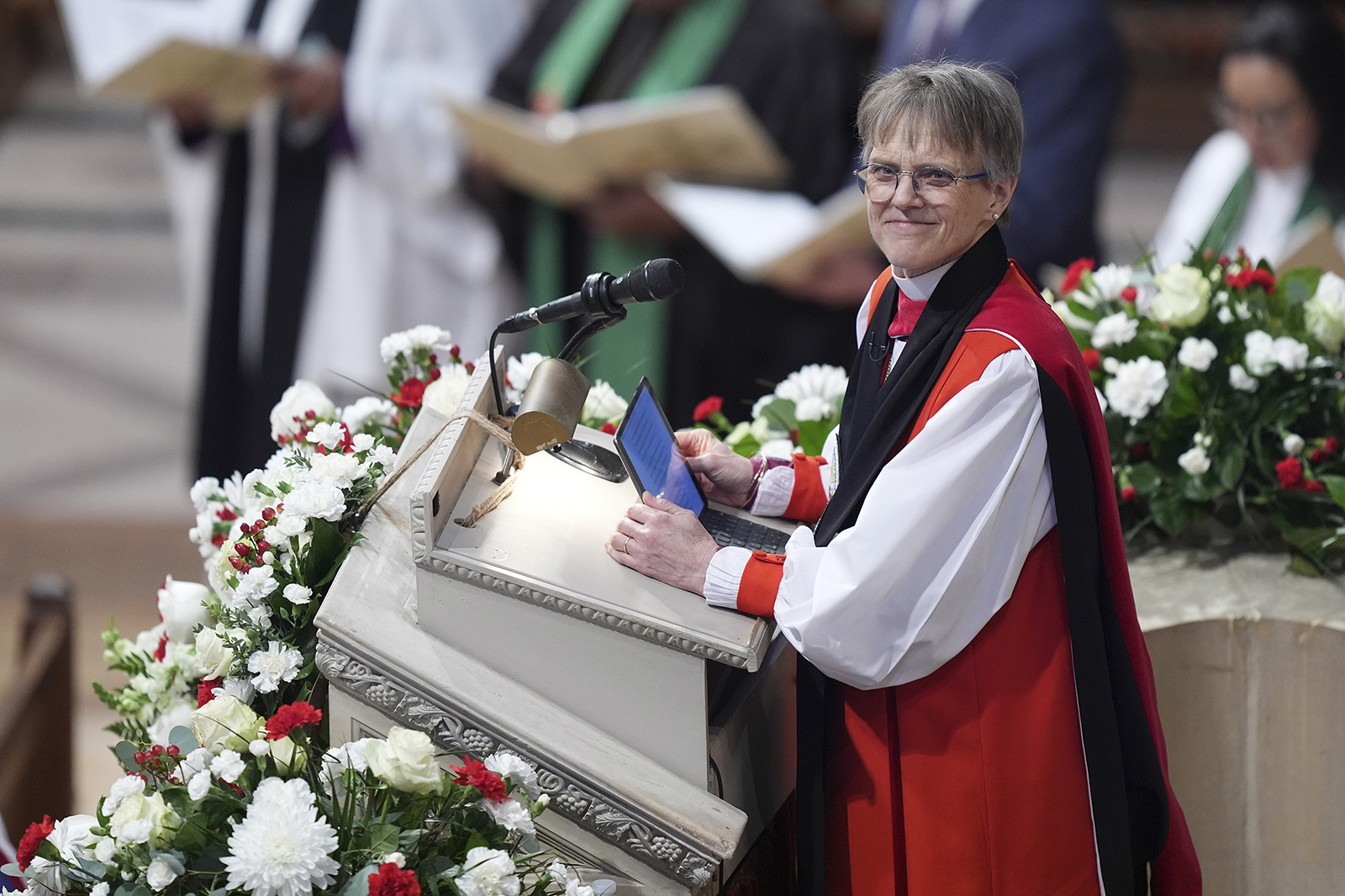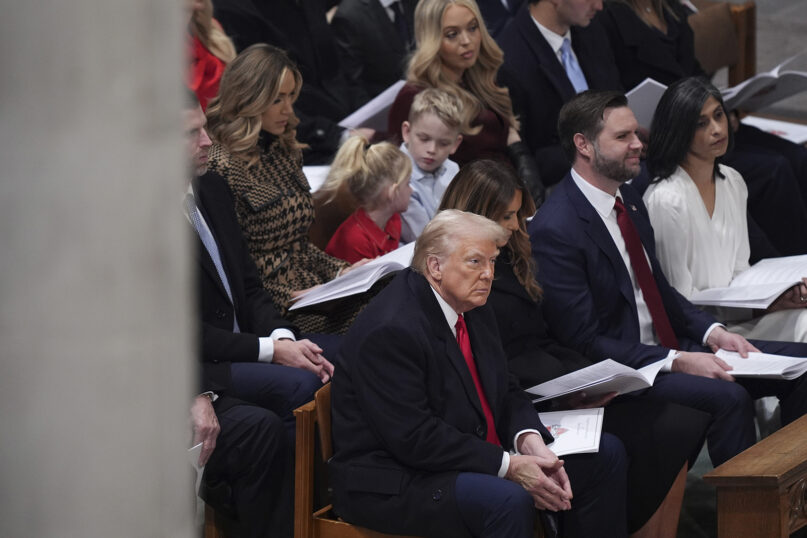
(RNS) — The controversy around Bishop Mariann Budde’s prophetic message to Trump this past week at the National Cathedral’s inaugural prayer service is a big deal, and it should be. It’s still making international news, and I’m writing this from Argentina where I’m preaching to about 2,000 evangelical Christians, many of whom are looking on in dismay.
This is not just about an isolated incident. What we are seeing is a tale of two Christianities. It’s why we now have T-shirts that say, “I’m a love your neighbor Christian not a storm the Capitol kind.” There are competing narratives of what the Christian faith is fundamentally about and what our priorities should be as followers of Jesus. And of course, it is also about race and patriarchy. We can’t forget the largest group of Trump supporters were white evangelicals at over 80% and the largest demographic of Trump’s opposition were Black women, many of whom are also deeply committed Christians. It is no coincidence that the Bishop is a woman; after all, nothing stirs the ire of Trump more than a woman in authority, even when she embodies humility and grace like Bishop Budde does.
After the homily, we got an unsurprising reactionary rant from Trump calling Budde a “so-called Bishop” and demanding an apology, and, of course, the other usual suspects chimed in on the evangelical right — Charlie Kirk, Sean Feucht, Franklin Graham. But their rhetoric is getting remarkably more hateful and dangerous.
Even I was stunned to hear Feucht, who I thought could no longer surprise me, respond with such reactionary Trump-like venom, calling Bishop Budde names like “witch,” “crazy woman” (he repeated that one many times), “God-hater,” “demonically inspired” – all in a matter of seven minutes. Feucht actually made the claim that the “devil himself” was inspiring this “crazy witch lady” with her “demonic filth” of “spells and perversion.” He literally made her out to be a sorceress casting spells.
All that because an Episcopal Bishop had the gall to say that every person is made in the image of God, and that we should show compassion to children and to immigrants and refugees, both indisputably core theological convictions of the Christian faith for centuries and central themes throughout the Bible’s Old and New Testaments.
On the one hand, this collision of Christianities is not new. Frederick Douglass named this reality over 100 years ago:
“Between the Christianity of this land, and the Christianity of Christ, I recognize the widest possible difference — so wide, that to receive the one as good, pure, and holy is of necessity to reject the other as bad, corrupt, and wicked. I love the pure, peaceable, and impartial Christianity of Christ; I therefore hate the corrupt, slaveholding, women-whipping, cradle-plundering, partial and hypocritical Christianity of this land. Indeed, I can see no reason, but the most deceitful one, for calling the religion of this land Christianity.”

President Donald Trump, from front row left, first lady Melania Trump, Vice President JD Vance, his wife Usha Vance, and from back row left, Eric Trump, his wife Lara Trump, their children Carolina and Luke, and Tiffany Trump attend a prayer service at the Washington National Cathedral, Tuesday, Jan. 21, 2025, in Washington. (AP Photo/Evan Vucci)
This is what is new, and noteworthy. The cult of Christian nationalism now has an evangelist — Donald Trump. Trump is not an evangelical Christian by any historic measure and fails any basic test of theological orthodoxy (as seen in many interviews when asked about personal salvation or the Bible). Even so, he has become an evangelist for the heretical cult of white supremacy that is trying to camouflage itself as Christianity.
The obvious problem, as evidenced in the service this week and the surge of hateful responses from Trump-evangelicals, is that MAGA’s version of Christianity doesn’t look or sound like the Jesus of the Gospels — who blessed the poor and the peacemakers, the meek and the merciful, who insisted we love our enemies and turn the other cheek, who commanded his disciples to sell their possessions and give the money to the poor. And, yes, who said that when we welcome the stranger, we welcome him because whatever we do to the “least of these” we do to Christ. That’s the Gospel of Jesus … and it looks very different from the gospel of Trump.
And it is the Gospel of Jesus, not Trump, that Bishop Budde so powerfully preached this week. Whether they admit it or not, it was Jesus, not an Episcopal Bishop, who offended them. It should be said that anyone who was offended by Bishop Budde’s two-minute homily will be even more offended by Jesus’ Sermon on the Mount.
It is getting harder and harder for reasonable Christians, even moderate and conservative-leaning evangelicals, to defend Donald Trump and his cold-hearted policies and rhetoric. Many who advocate for persecuted Christians around the world, like the evangelicals I am with this week, cannot defend Trump’s anti-immigrant policies that contradict the deep compassion they feel in their hearts for their refugee neighbors.
To riff off Douglass, between the Christianity of Trump and the Christianity of Christ, we recognize the widest possible difference — so wide, that to receive the one as good, pure and holy is of necessity to reject the other as bad, corrupt and wicked. I can see no reason to call this Christianity — except the most deceitful one.
And using Jesus as a tool for political power is the most deceitful one.
Trump has turned the seven deadly sins into a way of life, made a mockery of the fruits of the Spirit and regularly betrayed the core tenets of the Sermon on the Mount. He needs Jesus, to be sure, but it’s time to stop pretending he is actually a follower of Jesus. There comes a point when, in the words of Jesus, “We cannot serve two masters.” Christians cannot follow Trump and Jesus.
This is not about who we like better or align with politically. It’s not about choosing Team Budde or Team Trump. It is about two competing versions of the Christian faith. It’s not about left and right, but what it really means to be faithful to Jesus.
The word “Christian” means “Christ-like.” If it doesn’t look like Jesus, and it doesn’t sound like Jesus … let’s not call it Christianity. If it’s not about love and mercy … let’s not call it Christianity. If it’s not good news to the poor … let’s not call it Christianity. If it’s not about welcoming the stranger … let’s not call it Christianity.
If this were another era of history, church leaders and bishops would undoubtedly call for an emergency council, like the one in Nicea in 325 CE, and there would probably be a heresy trial. In a world with 2.4 billion Christians and more than 30,000 Christian denominations, that’s trickier to pull off. But the good news is we don’t need a council or a heresy trial to reach a verdict. A tree is known by its fruit. An apple tree doesn’t need a sign to tell you what it is. If it isn’t like Jesus, it isn’t Christianity.
The cult of Trump doesn’t even pass the sniff test — it doesn’t smell anything like Jesus or bear any of the fruits of the Spirit — love, joy, peace, patience, kindness, goodness, gentleness, faithfulness and self-control. There is nothing “Christ-like” about it.
It’s time to reclaim Jesus and our faith from those who would like to use Jesus as a cover for their bigotry. It is time to follow Jesus, not Trump.
